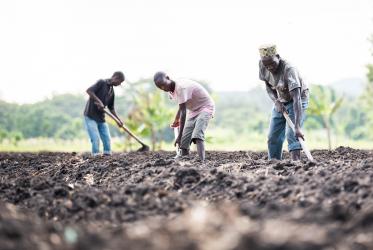The World Council of Churches (WCC), World Evangelical Alliance and All Africa Conference of Churches, along with church-related humanitarian organizations and a coalition of church-related networks and organizations and partners, are promoting 10 June as the second annual Global Day of Prayer to End Famine to be observed in faith congregations worldwide.
Dr Agnes Abuom, moderator of the WCC Central Committee stated, “We have to prayerfully and courageously overcome famine, by resolving conflicts and by promoting peace and justice. Let us work to increase community resilience in facing climate change and natural disasters, and receive and care for displaced people and help them re-establish their livelihoods and autonomy.”
Forced displacement, often due to armed conflicts, climate change or natural disasters, is driving people away from their homes and secure livelihoods. 30.6 million people were internally displaced in 2017, which is the equivalent of 80,000 people displaced each day, being pushed into inhospitable and hostile environments, making them more vulnerable to hunger, impoverishment, exploitation, and dependency.
The common drivers in most of the food crises around the globe are conflict and climate change. Today, around 80 percent of every dollar spent by the World Food Programme goes to operations in war zones. Conflicts in Afghanistan, the Central African Republic, Democratic Republic of the Congo, Iraq, Nigeria, South Sudan, Syria, Myanmar, and Yemen continue to force dramatic numbers of people to flee their homes. However, displacement is also caused by cyclones, violent storms and floods that swept across the Caribbean and South Asia, destroying vital infrastructure and leaving millions of people homeless.
Dr Ojot Miru Ojulu, assistant general secretary of the Lutheran World Federation for International Affairs and Human Rights and a member of the Strategy Group of the Food for Life Campaign of WCC-Ecumenical Advocacy Alliance, stated: “We are all sojourners - strangers and exiles on the earth (Hebrews 11:13), and we are mandated to welcome the stranger, the foreigner and the displaced. (Leviticus 19:33-34).”
Ojulu added: “It is noteworthy that most of the displaced people in the world are hosted by low and middle-income countries, such as Lebanon, Turkey, Iran, Ethiopia, and Pakistan, not by the wealthy and the advanced nations. The world needs to do much more! Given adequate support and accompaniment, displaced people can reenergize and renew the world.”
Let us observe 10 June as a Global Day of Prayer to End Famine. May our prayers join the millions of our sisters and brothers as they cry to the Lord to be delivered from their distress.
Reflection on Famine and Displacement
World Vision: Pray to End Famine






